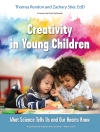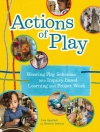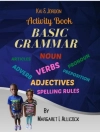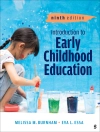Nurturing Children’s Social and Emotional Learning and Well-Being
Children’s relationships and experiences during their formative years have a far-reaching impact, and early childhood educators play a critical role in fostering the social and emotional competence children need to process and learn from these interactions. Explore how teachers can use the opportunities embedded in their curriculum, practices, and routines to support positive, healthy behaviors in children from birth through age 8.
The revised and updated edition of this volume reflects recent advances in brain science, the field’s heightened recognition of children’s cultural contexts as central components of their social and emotional development, and more. It covers a wide range of timely and timeless topics, including how to
- Establish trusting relationships to teach, model, and reinforce positive behaviors
- Honor each child’s dimensions of diversity and support the development of their individuality and humanity
- Engage in social justice projects that increase children’s empathy and sense of agency
- Mitigate the effects of trauma in children’s lives
- Implement strategies that relieve anxiety and teach coping skills
Each article in this collection also includes questions to prompt deeper thinking on the content, highlighting connections to developmentally appropriate practice. Using the guidance in this resource, help children develop the social and emotional skills essential to their future well-being and success.
Innehållsförteckning
Introduction
Marilou Hyson
Section 1: Identifying and Building Strengths
“Promoting Children’s Social and Emotional Health”
Jeannie Ho & Suzanne Funk
“‘I Can Do That!’ Creating Classrooms That Foster Resilience’
Vicki S. Collet
“What About the Children? Teachers Cultivating and Nurturing the Voice and Agency of Young Children”
Brian L. Wright
Section 2: Building Caring, Peaceful Communities
“Supporting Peer Relationships and Social Competence in Inclusive Preschool Classrooms”
Adam S. Kennedy
“Guidance Strategies to Prevent and Address Preschool Bullying”
Jill M. Raisor & Stacy D. Thompson
“Never Too Young to Support a Cause: Promoting Positive Identity Development Through Social Justice Curriculum in Preschool”
Veronica Benavides, Roxanne Ledda, & Maimuna Mohammed
Section 3: Supporting Children and Families in Difficult Times
“Creating Trauma-Sensitive Classrooms”
Katie Statman-Weil
“Supporting Anxious Children in the Preschool Classroom”
Sierra L. Brown, Allison Mc Cobin, Stephanie Easley, & Kara E. Mc Goey
“Welcoming Refugee Children into Early Childhood Classrooms”
Sadia Warsi
“Using Nature Contact to Support Children Under Stress”
Becky L. Del Vecchio, Susan Ferguson, & Wesley Knapp
Section 4: Integrating Social and Emotional Perspectives into the Curriculum
“Three for One: Supporting Social, Emotional, and Mathematical Development”
Linda M. Platas
“Partnering with Families Supporting Social and Emotional Development Through Picture Books”
Alison Hooper
“Paired Learning: Strategies for Enhancing Social Competence in Dual Language Classrooms”
Iliana Alanís & María G. Arreguín
Om författaren
Marilou Hyson, Ph D, consults nationally and internationally on early childhood issues, with special emphasis on emotional development and professional development for teachers. Formerly, Marilou was NAEYC’s associate executive director for professional development, where she led the development of several position statements and standards. She has been a preschool and kindergarten teacher and a university teacher educator.












